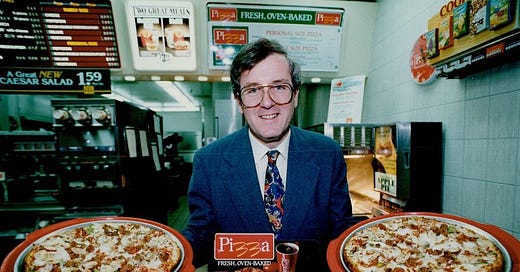McDonald's failed so that you might succeed
Saul Alinsky's Rule #2 for Radicals (and normie urbanists).
After learning a few secrets about how traffic engineers analyze intersections, you might feel the urge to jump into a debate with someone at the DOT in a public forum. I recommend holding off, because they’re likely to have responses that squelch your well-intentioned fight before it even begins.
I want you to avoid the embarrassment that McDonald’s suffered in the late 1980s.
McDonald's, in their quest to increase their dominance to unfathomable levels, decided to expand the menu beyond burgers and fries. What else are Americans eating? Focus groups said pizza was a great option. Chains like Domino's and Pizza Hut were growing in popularity, and corporate organizations can’t stand the thought of leaving revenue on the table.
McDonald’s had done an excellent job of turning their restaurants into little factories, churning out products with incredible efficiency. So naturally, they poured millions of dollars into research and development to create a pizza that could be made quickly, with the same level of consistency as their burgers. They even built special ovens and hired additional staff to handle the new menu item.
Customers weren’t having it. The McPizza was a flop.
The McPizza took forever to prepare and cook. Nobody wants to wait around more than a few minutes in McDonald’s. We’re in a hurry to suffer from indigestion. Pizza delays were a major problem for a fast food chain that was known for its speed and convenience. The funny thing is, McDonald’s treated their R&D project like something the dedicated pizza chains hadn’t thought of. What an ego blow.
Customers were constantly complaining about the quality, but management realized the problem was the employees making mistakes, not the ingredients. It was the kind of problem that might be overcome with a dollar menu product, but the McPizza was not cheap. McDonald’s was trying to make up for its huge up-front investment in new equipment and employee training. The McPizza was the most expensive menu item to produce and the least profitable for the franchisees.
On top of it all, customers didn’t associate the McDonald’s brand with pizza. Being budget minded wasn’t enough to take market share away from the growing “fast pizza” chains. The McPizza was eventually phased out.
McDonald's had gone into a business line they didn’t fully understand. They were experts in making fast burgers and fries, not pizza. The company had spent so much time and money trying to perfect a product that wasn't in their wheelhouse, instead of focusing on what they did best—making Americans regret life decisions.
One of Saul Alinsky’s rules for radicals (activists) is "Never go outside the expertise of your people."
I thought about the McPizza when I saw an embarrassing Twitter takedown. Someone who clearly knew a few traffic engineering terms started an argument with a traffic engineer, and the traffic engineer wasn’t having it. They went into a methodical thread, dismantling the anti-engineering crusader point by point. The crusader was mixing up terms, and clearly didn’t understand some of the basics of what local and state agencies require for land development projects.
McDonald’s did some amount of objective homework, but in hindsight they were too quick to shift to “how hard can it be?” mode. I see this same approach on social media. “Traffic engineering is dumb, so how smart can its experts be?!”
They’re very smart. I can tell you as a former traffic engineer that they’re misguided, but they aren’t dumb people. They understand far more nuance about their profession than many urbanists. That’s the type of trap Alinsky recommended activists avoid. It’s possible for your opponent to be wrong and still dismantle your attempts at a debate.
I’m not suggesting you don’t engage philosophical opponents in other professions. But when you do, the best approach might be asking questions. Listen carefully and ask detailed follow-up questions. Traffic engineering (or whatever the topic) will eventually become an area of expertise for you.
You’ll learn practical details about a profession to the point that you can steelman their position, which will make you a formidable debate opponent, on social media or IRL.





